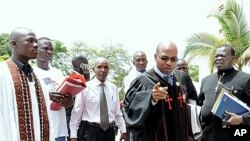Religious leaders in Uganda are calling for a renewed debate of the country's "anti-homosexuality" bill which they argue is essential to protect Ugandan children from homosexual recruitment.
On Wednesday, religious leaders and anti-homosexual activists from around Uganda gathered in parliament to urge debate on the country’s much-maligned “anti-homosexuality” bill.
The bill - also known as the Bahati Bill for the Member of Parliament who introduced it - has garnered worldwide attention for a provision which set the death penalty as punishment for certain homosexual acts. While the death penalty has since been removed from the bill, advocates continue to call for its passage as a means of protecting Uganda’s children.
Lead by Pastor Martin Ssempa, a charismatic and vocal opponent of homosexuality in Uganda, the group asked Ugandan Parliamentary Speaker Edward Kiwanuka to fight the emerging “homo-cracy” in Uganda and enter the bill for debate.
“We as religious leaders and civil society are distressed that the Anti-Homosexuality Bill is being deliberately killed largely by the undemocratic threats of western nations," he said. "These same nations who promote democracy don’t want our representative to discuss laws to protect our children from the human trafficking of recruiting our children into homosexuality.”
Ssempa leads the Inter-Religious Taskforce Against Homosexuality. During the session with Speaker Kiwanuka, the Task Force presented a portion of over 2 million signatures it said were gathered from around Uganda in support of the bill.
Ssempa and his counterpart Pastor Julius Oyet warned that homosexual advocacy groups were attempting to recruit Uganda’s youth to not only support gay rights but also engage in homosexual acts.
To strengthen their message, Ssempa also brought former homosexuals to recount their conversion to homosexuality. One of these witnesses, Paul Kagaba, told the Speaker of being seduced by prominent Ugandan gay activist David Kato at the age of 17.
“He bought two Guinness. It was my first time to take a drink. I was 17 years old. I was very, very weak. I heard him raping me. I can’t fight because I was so drunk. In the morning he started telling me: don’t fear, don’t tell parents. He gave me $130,” said Kagaba.
Kato, who was a frequent target of Ugandan tabloid media for his work, was beaten to death in front of his home in Kampala in January. While many activists attributed the killing to his advocacy for gay rights in Uganda, Uganda’s Police attributed his death to a dispute with a former lover.
The other witness was George Owundu, who told the audience of his former life as “Georgina, Queen Mother and Lady of the City.” Owundu said he was a founding member of Queer Youth Uganda, whose alleged mission was the “recruitment of the next generation of homosexuals.” Owundu accused a litany of human rights groups, including the London-based Amnesty International of financing the recruitment of young Ugandans into homosexual lifestyles.
Godfrey Odongo, a Uganda Researcher for Amnesty International dismissed the accusations as more of the same from the Task Force and its allies.
For his part, Speaker Kiwanuka appeared uncomfortable throughout the half-hour presentation of Pastor Ssempa and his Task Force. Despite the group’s claims of popular support, Kiwanuka set out to temper their enthusiasm when asked to speak.
“In this one I really don't know what will happen," he said. "But I wish to tell you that there are other people arguing that 'no, the bill is not necessary because there are other laws in our penal code that can cater for the situations that you have stated here.' And you know people are saying that this is a violation of human rights."
The bill is currently before the Legal and Parliamentary Affairs Committee in the Ugandan Parliament. The bill cannot be debated until approved and released by the committee.It appears, for now, that international pressure surrounding the controversial law has extinguished any serious support for its approval




